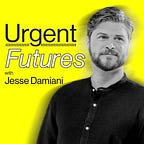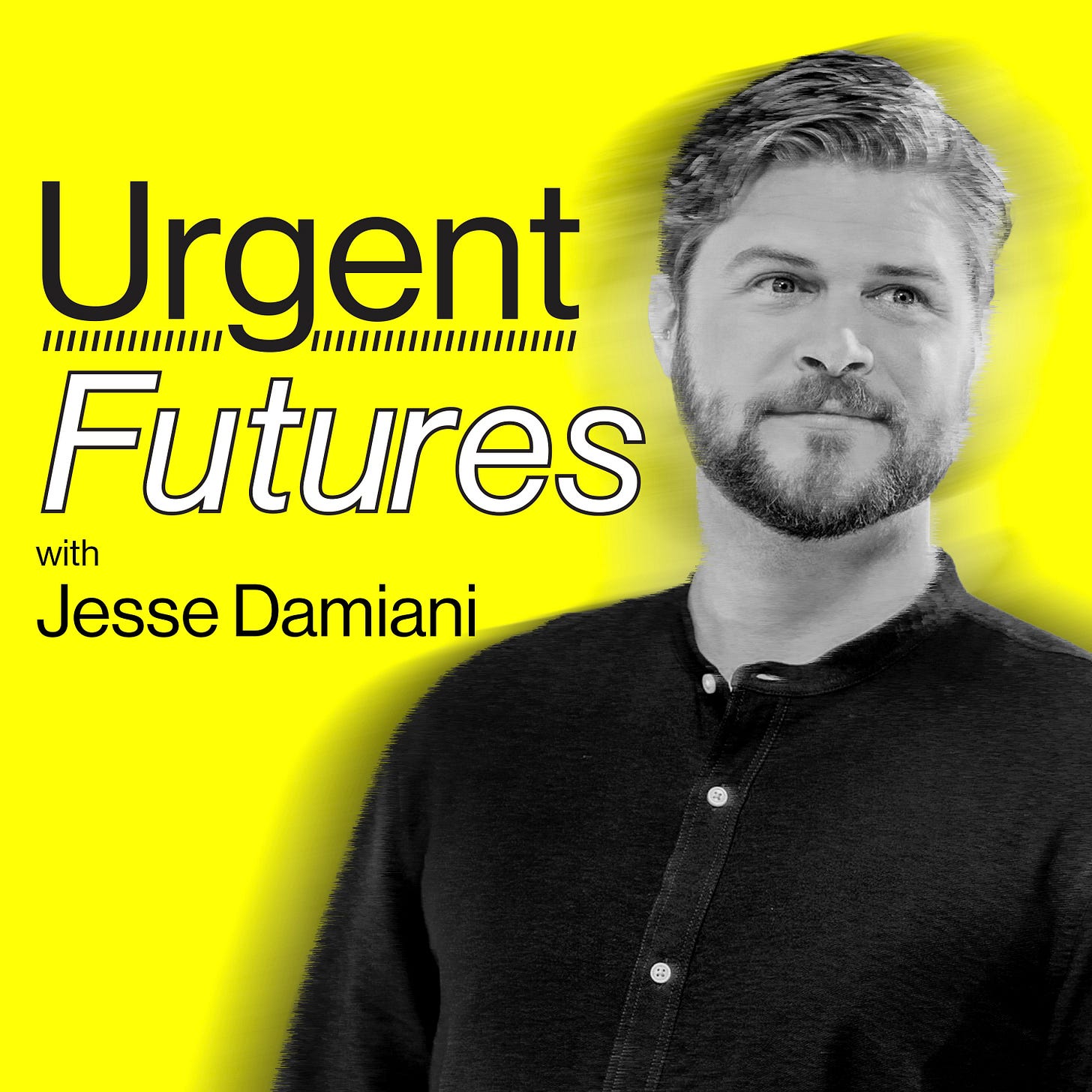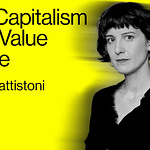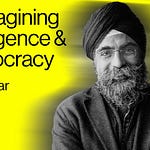Welcome to the Urgent Futures podcast, the show that finds {signals} in the noise. Each week, I sit down with leading thinkers whose research, concepts, and questions clarify the chaos, from culture to the cosmos.
The best way to support the show? 🤓 Pop over to YouTube and Subscribe. You hear it all the time for a reason—nothing will help the channel grow more than that simple click.
This is not a typical episode, and not the post-election episode I’d hoped to do. I knew I wasn’t going to run an interview during election week because of all the noise, but I’d fallen into the false assumption that I’d be doing an episode where I talked through the progressive ideals that didn’t make their way into the Harris campaign, and strategies + tactics we could use to hold the Harris administration accountable to them.
Alas.
There are so many takes, so much finger-pointing; I’m not here to add to any of that. I’m here to reflect on what it might mean for near- and longer-term futures, and the actions we should consider as a result.
You’ve probably heard the phrase "the end of history.” It’s a concept that has been used for hundreds of years. It presupposes that history is an evolutionary process that has a theoretical end destination—the point at which humanity “succeeds” in its sociocultural evolution by achieving its final (and optimal) form of government. The phrase was repopularized by political scientist Francis Fukuyama in his 1989 essay “The End of History?” followed by his 1992 book The End of History and the Last Man. In it, he claims that the conclusion of the Cold War marked such an “end of history”—that liberal democracy had succeeded as the final form of government. He wrote that this was:
Not just the end of the Cold War, or the passing of a particular period of postwar history, but the end of history as such: that is, the end point of mankind’s ideological evolution and the universalization of Western liberal democracy as the final form of human government.
Obviously that’s not how things shook out, but framing the end of the Cold War this way holds significant explanatory power for the sentiment of the time. It is with this spirit in mind—factoring for the inevitable ways this will prove incorrect and exaggerated—that I want to make a parallel claim that the re-election of Donald Trump heralds the end of the future. Or, to put it more accurately, the end of a future.
Obviously I don’t mean there isn’t a literal future—time marches on. What I mean is that with the election of Donald Trump, we witness the fall of liberal democracy as the prevailing political order. And with it, the demise of the core promise of the Bretton Woods system, the post-World War II international monetary framework undergirded by the U.S. government and dollar. That promise was global economic stability.
Technically the Bretton Woods system ended in 1971, when the dollar was depegged from gold, but the notion of globalized stability enforced by the United States has persisted through the ensuing era of neoliberalism. Below is a primer on neoliberalism, but all you need to know for purposes here is that it’s characterized by deregulation and free-market capitalism (unless you’re a big bank in 2008, that is). TLDR: it’s the political and economic philosophy of Thatcher and Reagan.
One of the key questions about Trump’s return to the Oval Office is if he will pull the U.S. out of NATO, effectively breaking the military and defense ties between America and its long-time allies in Europe. If he does—and I believe he will—it will be the strongest signal yet that he intends to align the U.S. with a new power axis alongside other authoritarian strongmen like Recep Tayyip Erdoğan (Turkey), Nicolás Maduro (Venezuela), Benjamin Netanyahu (Israel), Viktor Orbán (Hungary), Vladimir Putin (Russia), and others. I’m sure a better term will emerge for this, but for purposes here let’s call it the MAGA Axis.
Of course, Liberal democracy as expressed in reality has long fallen short of its ideals, and the oligarchic, corrupt form it took in the United States is emblematic of these failures. In its fall we can identify a silver lining, which I’ll get to in a bit, but what looms now is a hard pivot toward accelerationism and worldwide authoritarianism.
If this transpires, the narratives, cultural mythologies, and civilizational logics that most people alive today grew up within are likely to be displaced. We would be in a fundamentally new world order. Building on Yanis Varoufakis’s notion of technofeudalism—which holds that we actually no longer live under capitalism, but rather a new form of “cloud feudalism”—what I fear is that we’re going to see a cannibalization of the worst of neoliberalism within an umbrella of plutocratic authoritarianism, in which oligarchs around the world have been given a bright green light on their worst, most corrupt impulses.
An early signal to demonstrate the point": the wealthiest ten people in the world racked up $64B in wealth off Trump’s win, even as Elon Musk, who helped win Trump the election, is promising to cut $2 trillion of supposed government bloat. By Musk’s own admission, his actions are likely to induce “hardship” and a “severe” economic downturn, felt palpably by the middle and working classes. If this really does come to pass, most of the population who voted for Trump because of a perception he’s strong on economy are going to discover whose economic situation he’s interested in improving. As are the rest of us. America is for sale.
To be clear: I would love to be wrong on this. If Donald Trump does not take us down this path, I will be thrilled. Because if I and the many others who are worried about this are correct in our forecast, it’s safe to say that whatever you had formerly imagined your future to be is now a distant dream. I see this in conversations I’ve had with folks since the election, a general sense of disorientation and bewilderment about what they do with their lives now.
In July, President of the Heritage Foundation Kevin Roberts said the coming ‘Second American Revolution’ would be bloodless “if the left allows it to be.” Given their success, I think it’s helpful to see the election of Trump as the formal secession of this “bloodless” revolution. America seceded from democracy and from its role as enforcer of the existing world order. To reiterate, the Bretton Woods system, and neoliberalism after it, were highly problematic, prizing stability for wealthy democracies in the global north over the wellbeing of the rest of the world. We have this system to thank for countless wars, genocides, and dehumanization in service—at the end of the day—of growing the economy. Unfortunately, the prospective emerging world order is poised to be vastly worse on basically every count.
With this election, I’m seeing lots of comparisons to Nazi Germany thrown around. Is this 1933 Germany or 1939 Germany? Such historical analogues are critical to analyzing the moment, but the major difference is that America is the global hegemon. The U.S. military outspent the next ten countries combined in 2022. And the countries the U.S. seems likely to align with under Trump include other major world militaries: China, India, Israel, Russia, and Saudi Arabia. The other obvious difference is that nuclear weapons exist now, amplifying the danger of any possible confrontation—and together the U.S. and Russia hold 90% of the world’s supply.
At home, the gravest danger to democracy America faces is that, with the likely “trifecta” control of all branches of the U.S. government, the Trump administration will be able to interfere with the voting apparatus in this country. If it were to do this, I have a hard time imagining how any future election would be anything but performative, rigging the system in favor of MAGA every time. I’m no voting expert, but all I can say on this front is that anything any of us can do to preserve voting infrastructure such that fair elections can still occur seems to be the highest priority direct political action we can take.
So…now what?
We’re not without options, but the first thing we need to do is be honest with ourselves. On the one hand, we need to accept the fact that the world order has changed. We can assume no person or entity in the government has our best interests in mind—and the ones who do will have virtually no ability to help us. It’s a strategically abysmal position. Nothing lasts forever, but we have to move through the stages of grief to land at acceptance, at which point the real work can begin. We have to accept the fact that we may live under the MAGA Axis for the rest of our lives.
To start we must build solidarity, trust, and basic skills. We have to get over our infighting; Leftists and Liberals need to emphasize shared beliefs over division. Even when the division is bitter, we need to hold our noses and work together. We need to build a true, cross-industry labor movement. We need to organize in local, analog spaces rather than perform our ideas on social media. We need to focus on local solutions within our power, whether they involve politics or not, such as mutual aid networks. We need to learn basic survival skills, whether that’s first aid, foraging, or self-defense. Even if you’re not in danger of hate crimes, others might be, and we need to know how to take care of each other. Speaking of self-defense: a note on digital hygiene. Go get a VPN and password manager, and start using encrypted messaging apps (Signal is better than WhatsApp and Telegram). Think of these as seatbelts and airbags; they don’t make you surveillance-proof, but they provide the first layer of protection. For what it’s worth, there are always good Black Friday deals on VPNs and password managers—and as a general reminder, don’t use free security products—if it’s free, you’re the product.
Arguably the most quantitatively devastating aspect of this election is how it will exacerbate climate change and overshoot, which impact not only every human, critter, and microbe alive today but every future being. Trump’s advisers told Axios that Trump is going to push “fast action on a business-friendly agenda of tax cuts, deregulation and expanded energy production.”
The situation was already quite dire; we were already burning our way to the ‘1.5° C to stay alive’ limit, with only acceleration in sight. The Inflation Reduction Act was a critical step in the right direction, but for all the gains it made, it was nowhere near aggressive enough to get us on track to stay below even 2° C warming. And the difference between 1.5° and 2° warming is staggering—with the former, we might expect to still have some coral reefs and Arctic ice in 2100, with the latter we likely wouldn’t.
So, the silver lining. If there’s one glimmer of hope, it’s this: the world order dominated by Liberal democracy and neoliberal economics showed no sign of doing anything but band-aid fixes in service of maintaining the status quo economic growth imperative. Though the Democratic Party might feel like the lesser of two evils, it is one of the worst offenders on this front, succumbing to status quo and monied interests over the hopes, desires, and needs of its base.
Perhaps in the shattering of one world order there are opportunities to build bottom-up communities of care and cyborg forms of innovation aligned with the processes of nature—and do so powerfully before the MAGA Axis solidifies. Perhaps this opens up new avenues for finding meaning and purpose in life. Perhaps this new reality will prompt new creative interventions that obstruct the bulldozing of life on Earth. It’s not that the problems of modernity weren’t evident before; they were. But they will be inescapable now. Perhaps the shattering of the status quo will drive more folks toward responses and communities that should have been front-and-center all along.
There are folks who have already been pursuing such change, and I’ve been lucky to speak to some of them on this show. I already believed their ideas were urgent before last Tuesday, only more so now. I’ll call out a few here that I think are helpful starting points if you haven’t had a chance to watch or listen:
Mycologist Danielle Stevenson on how mycoremediation could heal polluted sites
Professors Laura Forlano and Danya Glabau on cyborg futures
Professor Philip V. McHarris on strategies for community care and safety that don’t rely on policing
Artist-Activists Eryk Salvaggio & Carolione Sinders on algorithmic resistance and misusing AI for good
Conservationists Gerardo Ceballos & Paul R. Ehrlich on the wealth of biodiversity, and what we must do to protect it
Artist Autumn Breon on reimagining oppressive systems through art
Ecologist/ecological economist William E. Rees on understanding the fundamental problem of overshoot
Economics communicator Michael Mezzatesta on degrowth and the prospect of a post-growth economy
Artist and Intellectual Nora Bateson on ecological thinking and relating to each other through the question “Who can you be when I’m with you?”
Even if you don’t watch or listen to my episodes, I encourage you to find their work and learn from them. And I’m not going to stop publishing this type of stuff. If anything, I’m more energized than ever to boost urgent ideas that might help us survive and thrive our volatile futures. This is my way of putting out a bat signal; if this stuff resonates with you, let’s talk.
For now, I’m using these next 3 months to get my life in order, rest, and prepare for a long storm. I hope you will too. Sending love—stay safe out there.













